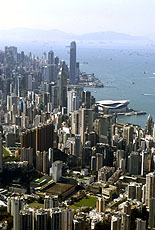 |
| Financial hub: High investment income flowing in and out of Hong Kong reflects the city's role as a financial centre. |
|
|
Hong Kong's second quarter gross national product grew 7% over the same period last year to $333.2 billion, while gross domestic product grew 5.7% to an estimated $328.4 billion, the Census & Statistics Department says.
Compared with GDP, the value of Hong Kong's GNP was up $4.8 billion, representing a net external factor income inflow of the same amount, and equivalent to 1.5% of GDP in the quarter.
After netting out the effect of price changes, Hong Kong's GNP rose 8.1% in real terms, higher than the corresponding increase of 6.8% recorded for GDP.
Both investment income inflow and outflow posted substantial increases in the second quarter, on the back of improved corporate profitability worldwide as well as increased interest income due to higher interest rates.
Income inflow
Total factor income inflow into Hong Kong, estimated at $133 billion and equivalent to 40.5% of GDP, grew 44.1% over a year earlier. Total factor income outflow was estimated at $128.3 billion and equivalent to 39.1% of GDP, representing an increase of 40.1% over a year earlier. Taking the inflow and outflow together, a net external factor income inflow of $4.8 billion was recorded.
Within total factor income inflow, direct investment income rose 52.6% over a year earlier, mainly due to increased earnings of some prominent local enterprises from investment abroad. Portfolio investment income grew 8.9%, mainly attributable to increase in interest income from holding of non-resident debt securities during the period. Other investment income surged 106.9% over a year earlier, mainly on account of increased interest income from offshore loans and deposits of the local banking sector due to increases in interest rates.
Within total factor income outflow, direct investment income went up 36.6% over a year earlier, largely attributable to increased earnings of some prominent multinational enterprises from investment in Hong Kong during the period. Portfolio investment income rose 28.3%, mainly due to increased dividend pay-outs by a number of resident publicly listed companies. Other investment income surged 98.9%, mostly on account of increased interests paid arising from external loans and deposits of the local banking sector due to increases in interest rates.
The huge amount of investment income flow into and out of Hong Kong, both equivalent to about two-fifths of the GDP, has reflected the city's role as a financial centre and a regional hub in aiding external investment activities. With investment income inflow grew faster than outflow, leading to a much larger net external factor income inflow, GNP rose at a faster pace than GDP in the second quarter.
External income
Analysed by country and territory, the British Virgin Islands was the largest source of Hong Kong's external factor income inflow in the second quarter, accounting for 29.2%, reflecting continued investment income inflow from this tax haven economy where Hong Kong companies had set up a considerable number of holding companies.
This was followed by the Mainland, with a share of 25.7%. Other major sources were the US and the UK, at 9.5% and 4.9%.
The Mainland and British Virgin Islands were also the most important destinations for Hong Kong's external factor income outflow, accounting for 20.6% and 16.9%. Other major destinations included the US, at 15.3%, and the Netherlands, at 9.9%.
Go To Top
|



